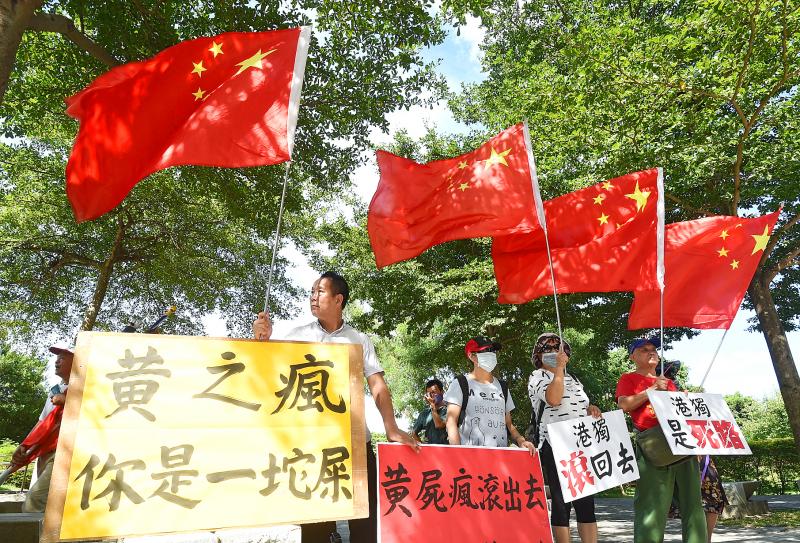Democratic Progressive Party (DPP) Legislator Wang Ting-yu (王定宇) proposed an amendment to the National Security Act (國家安全法) to ban activities that promote Taiwan’s unification with China, damage Taiwan’s national identify, or other actions that work in the favor of China, Hong Kong and Macau, or other foreign opposition forces.
The draft amendment includes fines of NT$10,000 to NT$100,000, with fines for displaying the People’s Republic of China flag of up to NT$50,000.
The proposed amendment has so far gathered support from 28 DPP lawmakers and Taiwan Statebuilding Party Legislator Chen Po-wei (陳柏惟).

Photo: Liu Hsin-de, Taipei Times
However, a number of Chinese Nationalist Party (KMT) spoke out against the proposal, citing freedom of speech concerns.
There is no law defining China as an enemy, KMT Legislator Chen Yu-jen (陳玉珍) said yesterday, adding that banning the flag would require amendments to the Act Governing Relations Between the People of the Taiwan Area and the Mainland Area (兩岸人民關係條例).
It would be more reasonable to ask people not to wave the flag or sing the national anthem of an enemy country, Chen said.
As the DPP holds the legislative majority, amending laws to define China as an enemy would not be hard, she said, adding that “as long as the process is democratic, I will support it.”
Taiwan People’s Party Legislator Jang Chyi-lu (張其祿) said that despite China’s threat to Taiwan, banning its flag would only be possible if a law defines China as an enemy country.
KMT caucus whip Lin Wei-chou (林為洲) said that a draft act must clearly define whether displaying the Chinese flag is covered by freedom of speech or constitutes subversion, adding that the biggest difference between Taiwan and China is that Taiwan is a democracy with freedom of speech.
KMT caucus secretary-general Lin Yi-hua (林奕華) said that the government should not limit freedom of speech, as this would be an “overreach of state power.”
KMT Legislator Lee Guei-min (李貴敏) said that several constitutional interpretations and court rulings have safeguarded the right to any form of expression.
The draft act would imperil the unity of Taiwanese and the sustainable development of the nation, Lee said, adding that provocation should be avoided in the interest of the nation.
Additional reporting by Huang Hsin-po

Taiwan has received more than US$70 million in royalties as of the end of last year from developing the F-16V jet as countries worldwide purchase or upgrade to this popular model, government and military officials said on Saturday. Taiwan funded the development of the F-16V jet and ended up the sole investor as other countries withdrew from the program. Now the F-16V is increasingly popular and countries must pay Taiwan a percentage in royalties when they purchase new F-16V aircraft or upgrade older F-16 models. The next five years are expected to be the peak for these royalties, with Taiwan potentially earning

STAY IN YOUR LANE: As the US and Israel attack Iran, the ministry has warned China not to overstep by including Taiwanese citizens in its evacuation orders The Ministry of Foreign Affairs (MOFA) yesterday rebuked a statement by China’s embassy in Israel that it would evacuate Taiwanese holders of Chinese travel documents from Israel amid the latter’s escalating conflict with Iran. Tensions have risen across the Middle East in the wake of US and Israeli airstrikes on Iran beginning Saturday. China subsequently issued an evacuation notice for its citizens. In a news release, the Chinese embassy in Israel said holders of “Taiwan compatriot permits (台胞證)” issued to Taiwanese nationals by Chinese authorities for travel to China — could register for evacuation to Egypt. In Taipei, the ministry yesterday said Taiwan

‘LIKE-MINDED PARTNER’: Tako van Popta said it would be inappropriate to delay signing the deal with Taiwan because of China, adding he would promote the issue Canadian senators have stressed Taiwan’s importance for international trade and expressed enthusiasm for ensuring the Taiwan-Canada trade cooperation framework agreement is implemented this year. Representative to Canada Harry Tseng (曾厚仁) in an interview with the Central News Agency (CNA) said he was increasingly uneasy about Ottawa’s delays in signing the agreement, especially as Ottawa has warmed toward Beijing. There are “no negotiations left. Not only [is it] initialed, we have three versions of the text ready: English, French and Mandarin,” Tseng said. “That tells you how close we are to the final signature.” Tseng said that he hoped Canadian Prime Minister Mark Carney

POSITIVE DEVELOPMENT: Japan and the US are expected to hold in-depth discussions on Taiwan-related issues during the meeting next month, Japanese sources said The holding of a Japan-US leaders’ meeting ahead of US President Donald Trump’s visit to China is positive news for Taiwan, former Japan-Taiwan Exchange Association representative Hiroyasu Izumi said yesterday. After the Liberal Democratic Party’s landslide victory in Japan’s House of Representatives election, Japanese Prime Minister Sanae Takaichi is scheduled to visit the US next month, where she is to meet with Trump ahead of the US president’s planned visit to China from March 31 to April 2 for a meeting with Chinese President Xi Jinping (習近平). Japan and the US are expected to hold in-depth discussions on Taiwan-related issues during the